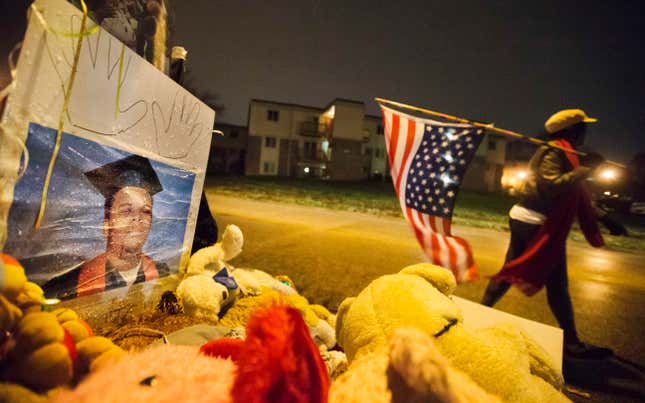
Wesley Bell, St. Louis County’s top prosecutor, announced Thursday that his office would not bring charges against Darren Wilson, the former Ferguson, Mo., police officer who shot and killed 18-year-old Mike Brown in 2014.
“Although this case represents one of the most significant moments in St. Louis’s history, the question to this office is a simple one: Could we prove beyond a reasonable doubt that when Darren Wilson shot Michael Brown, he committed murder or manslaughter under Missouri law? After an independent and in-depth review of the evidence, we cannot prove that he did,” Bell said in a news conference yesterday, according to NPR.
The decision comes after a five monthlong independent review of the case. Bell, the county’s first Black prosecutor, called the decision “one of the most difficult things I’ve had to do as an elected official,” reports The Washington Post.
Brown, a recent high school graduate, was gunned down by Wilson on Aug. 9 2014, after Wilson responded to a call regarding a theft from a convenience store. Wilson ended up shooting Brown six times; police left his body in the street for hours afterward.
Bell cautioned that his office’s decision, “does not exonerate Wilson.”
“The question of whether we can prove a case at trial is different than clearing him of any and all wrongdoing,” said Bell.
“There are so many points at which Darren Wilson could have handled the situation differently. And if he had, Michael Brown might still be alive. But that is not the question before us. The only question is whether we can prove beyond a reasonable doubt that a crime occurred. The answer to that question is no.”
Bell won election in 2018 on promises of reform, ousting longtime St. Louis County Prosecutor Robert McCulloch.
McCulloch was widely criticized for his handling of Wilson’s case, declining to press charges against the officer and sending it to a grand jury instead. The jury did not return an indictment against Wilson, who resigned from the Ferguson police department shortly after.
That a prosecutor who campaigned on criminal justice reform could reach the same conclusions as McCulloch shows the limits of “progressive” prosecutors, particularly when laws are written in such a way that make it difficult to press charges against officers. The decision also comes at a time when a growing number of social justice activists are moving away from the goals of “reforming” criminal justice systems, and seeking more transformative change.
At Thursday’s press conference, one man in the audience, wearing a shirt that read, “Wesley Bell doesn’t care about Black people,” gave voice to this frustration.
“Five months. Six years. People out on the street—nothing?” he said, referring to the length of the investigation, and the length of time since Brown was killed.
“It’s over. One term!” He shouted as police walked him out of the room.
ArchCity Defenders, a social justice advocacy group based in St. Louis, wrote in a statement shared on Twitter, “For many, this news has unearthed painful memories and reopened still-unhealed wounds.”
“In a moment during which many thousands of people are taking to the streets to demand we build a society in which Black lives matter, we are reminded yet again that all too often, in the eyes of our criminal legal system, they do not,” it continued, quoting Audre Lorde’s famous words, “the master’s tools will never dismantle the master’s house.”
“We now recommit to the work of transforming our communities to honor the life and loss of Michael Brown, Jr. and the homegrown movement that he inspired.”
Aug. 9 will mark the sixth anniversary of Brown’s death, which gave rise to the Black Lives Matter movement.
In a recent op-ed for The Root, Brown’s mother, Lezley McSpadden Head, called for reparations to the families impacted by police brutality and police killings, noting “people and institutions that harm Black people should take concrete action to repair the harm done.”

